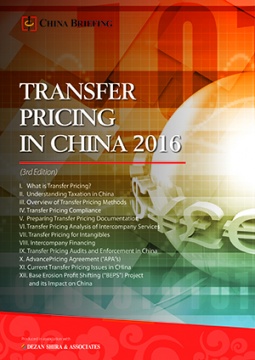In Curbing Transfer Pricing, China Moves Beyond OECD Guidelines
 By Sowmya Varadharajan, IC Advisors Pte Ltd
By Sowmya Varadharajan, IC Advisors Pte Ltd
On March 18 2015, the State Administration of Taxation (SAT) made an announcement on Issues relating to Corporate Income tax on Expenses Paid by an Enterprise to its Overseas Affiliated Party. The announcement reiterates the need for payments made to related parties to be consistent with the arm’s length standard. It has always been necessary to provide relevant documents to show compliance with the arm’s length standard. However, the latest announcement introduces additional requirements that need to be met before the SAT will allow tax deductions for payments to overseas affiliates.
Specifically, the SAT noted payments to overseas related parties that do not perform any key functions or do not bear risk will not be deductible.
![]() RELATED: China Moves to Curb Transfer Pricing – Effective Immediately
RELATED: China Moves to Curb Transfer Pricing – Effective Immediately
This policy essentially requires the overseas affiliate to perform substantial business activities. Tax planning structures, where an entity is incorporated in a tax advantaged jurisdiction (e.g. the Cayman Islands, British Virgin Islands) to charge fees to Chinese subsidiaries, may therefore no longer be permissible. In order for the expense to be deductible in China, the Chinese entity making the payment has to demonstrate the substantial business activities of the overseas affiliate receiving payment.
As per the announcement, the following services are explicitly excluded:
- Services such as control, management or supervision that are rendered for the purpose of protecting the interests of the company’s shareholders. As the China-based entity is not the beneficiary of these services, these transactions do not comply with the arm’s length principle and are therefore not deductible
- Duplicate services: e.g. where the Chinese taxpayer has purchased or carried out services by itself, yet also pays an overseas affiliate for them.
- Services that are passive or ancillary in nature – i.e., there is no specific service that is carried out by the overseas related party specifically for the Chinese enterprise
- Services that do not bring about direct or indirect economic benefit to the enterprise
- Services that are irrelevant to the risks or business that the Chinese taxpayers carries out
- Services that have already been compensated for in other transactions
With respect to payment for services, this announcement is broadly consistent with the current services regulations that have been established in most jurisdictions. For example, Chapter 7 of the OECD Transfer Pricing Guidelines details how service transactions should be analyzed in relation to transfer pricing, and covers most of the above considerations.
However, the SAT has gone one step further in relation to services transactions by specifically including the points 5. and 6. The requirement to demonstrate that services are relevant to the business that the Chinese entity carries out may actually limit the practice of charging a management fee that most multinational corporations have adopted in respect of subsidiaries.
This issue has also been raised in the comments the SAT provided to the United Nations for the development of the chapter on services in its transfer pricing guidelines. Specifically, the SAT notes in an example that various advisory and legal services are provided by a parent company to a manufacturing subsidiary in China. Although these services do benefit the Chinese subsidiary, they may not be needed given the functions performed by the manufacturer. Thus, it is clear that the SAT requires a more detailed analysis of the services the overseas affiliate has performed before it will allow a deduction.
![]() RELATED: U.S. Officials in Hong Kong Gathering FATCA Non-Compliance Data
RELATED: U.S. Officials in Hong Kong Gathering FATCA Non-Compliance Data
While this announcement concerns itself primarily with the payment for services, it also mentions situations where the SAT may not allow deduction for royalty expenses. In the case of royalties, the SAT brings out an important distinction between the legal ownership and economic ownership of intellectual property rights. If an entity only has legal ownership and does not invest in the economic ownership of the IP, royalty payments may not be deducted. The Chinese enterprise is expected to determine to what extent the overseas affiliated parties contributed to the creation of the intellectual property, and pay the entities involved on that basis. Again, this is likely to increase the transfer pricing documentation compliance burden faced by Chinese enterprises that would like to establish tax-efficient structures where royalty payments are deductible in China, with the royalty income taxed at a tax-advantaged jurisdiction.
In general, scrutiny on service fees and royalties have been on the rise in China. In July 2014, the SAT released an internal notification (Circular 146) to urge tax authorities at all levels to carry out extensive tax investigations on substantial amounts of service fees and royalties made to overseas related parties. Against this backdrop, the recent announcement has provided some clarity on how multinational corporations should structure their services and royalty payments out of China.
Sowmya Varadharajan is a founding director of IC Advisors Pte Ltd, a transfer pricing consulting firm. Sowmya has more than 12 years of experience assisting clients in designing, supporting and defending various related party transaction structures. Having been trained in the U.S., Sowmya currently focuses her attention on helping clients in the Asia Pacific region address their transfer pricing issues.
|
Asia Briefing Ltd. is a subsidiary of Dezan Shira & Associates. Dezan Shira is a specialist foreign direct investment practice, providing corporate establishment, business advisory, tax advisory and compliance, accounting, payroll, due diligence and financial review services to multinationals investing in China, Hong Kong, India, Vietnam, Singapore and the rest of ASEAN. For further information, please email china@dezshira.com or visit www.dezshira.com. Stay up to date with the latest business and investment trends in Asia by subscribing to our complimentary update service featuring news, commentary and regulatory insight. |
![]()
 Transfer Pricing in China 2016
Transfer Pricing in China 2016
Transfer Pricing in China 2016, written by Sowmya Varadharajan in collaboration with Dezan Shira & Associates and Asia Briefing, explains how transfer pricing functions in China. It examines the various transfer pricing methods that are available to foreign companies operating in the country, highlights key compliance issues, and details transfer pricing problems that arise from intercompany services, intercompany royalties and intercompany financing.
 Annual Audit and Compliance in China 2016
Annual Audit and Compliance in China 2016
In this issue of China Briefing, we provide a comprehensive analysis of the various annual compliance procedures that foreign invested enterprises in China will have to follow, including wholly-foreign owned enterprises, joint ventures, foreign-invested commercial enterprises, and representative offices. We include a step-by-step guide to these procedures, list out the annual compliance timeline, detail the latest changes to China’s standards, and finally explain why China’s audit should be started as early as possible.
Managing Your Accounting and Bookkeeping in China
In this issue of China Briefing, we discuss the difference between the International Financial Reporting Standards, and the accounting standards mandated by China’s Ministry of Finance. We also pay special attention to the role of foreign currency in accounting, both in remitting funds, and conversion. In an interview with Jenny Liao, Dezan Shira & Associates’ Senior Manager of Corporate Accounting Services in Shanghai, we outline some of the pros and cons of outsourcing one’s accounting function.
- Previous Article Buying and Printing Fapiao
- Next Article China to Roll Back Local Tax Incentives for Foreign Investors



























